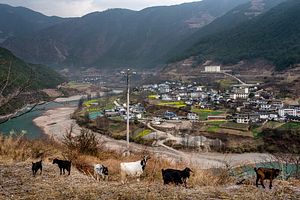Luc Forsyth and Gareth Bright have set out on a journey to follow the Mekong river from sea to source. The Diplomat will be sharing some of the stories they’ve found along the way. For more about the project, check out the whole series here.
We came to the village of Xialuoga intending to photograph a traditional agricultural lifestyle, not to investigate the consequences of hydropower dams. But as we spoke to locals, we couldn’t ignore the fact that their futures are inexorably tied to the region’s energy development.
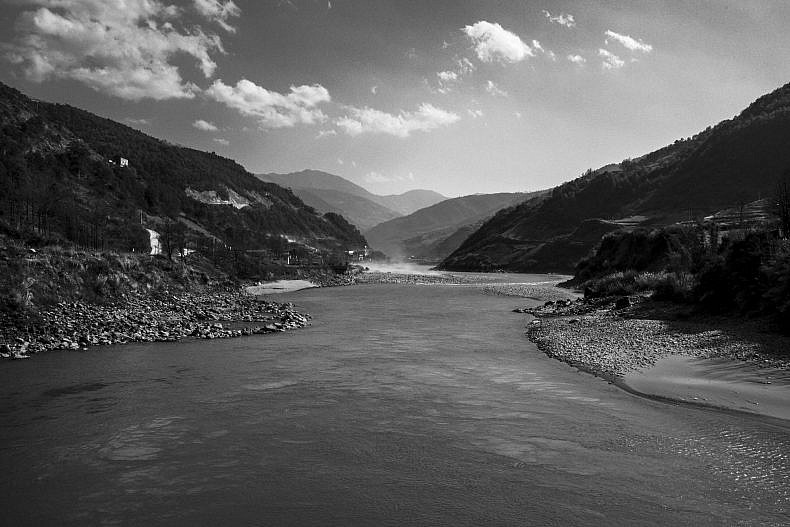
The village of Xialuoga in Yunnan sits along the banks of the Lancang (Mekong) river. Photo by Gareth Bright.
“They keep offering us more and more money, but it’s not about money,” the dump truck driver said. He was hauling loads of sand up the narrow mountain roads of the tiny village of Xialuoga to a construction site where he and his family were building a new house. They weren’t doing this because of an increase in fortune or fate, but rather because of the coming flood. Xialuoga’s farmlands were slated for inundation once the Tuoba hydropower dam on the Lancang was completed and residents had little choice but to prepare to move to higher ground, abandoning whatever low-lying assets they had built up over generations.
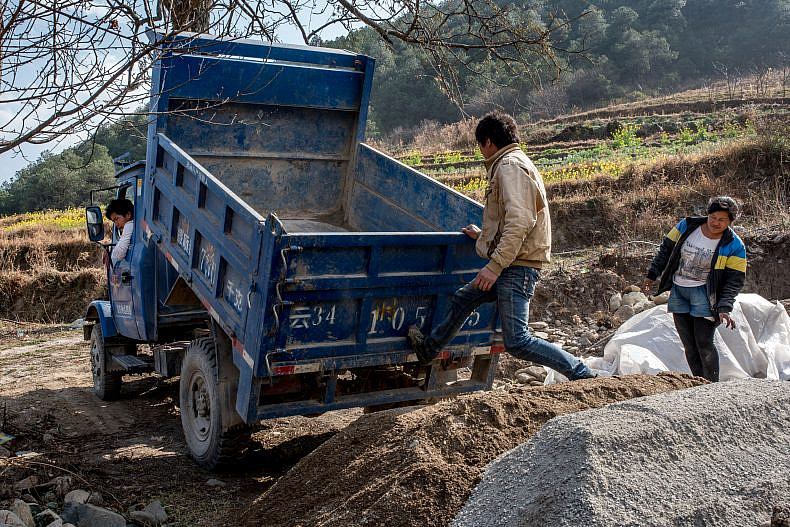
Residents of Xialuoga lay the foundations for a new house high up in the mountains to avoid the projected rising water level. Photo by Luc Forsyth.
“Money comes and goes but our families need to be fed everyday,” the driver continued. “Without land, how can we be sure of their basic needs?”
The forced relocation of people living along the banks of the Mekong was a story we had encountered repeatedly throughout our journey. From the cheaply-built relocation camps of Laos to the Bunong ethnic minority groups fighting to save their land in northeastern Cambodia, the human cost of energy development was high throughout the region.
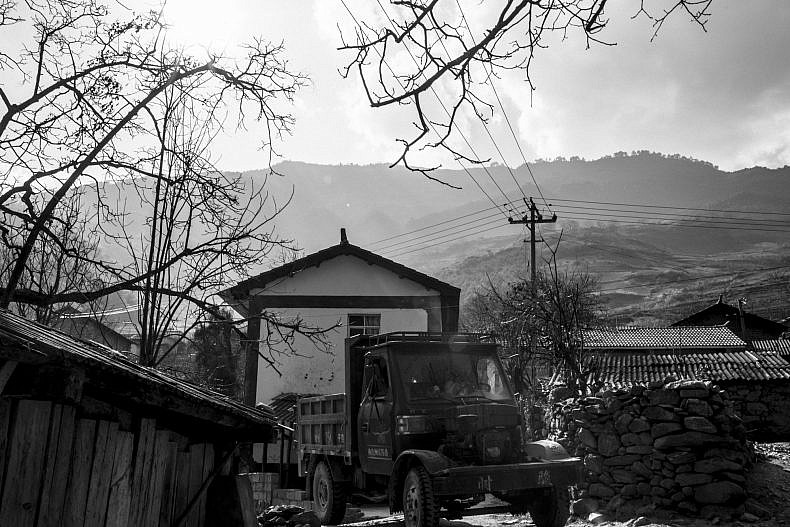
Xialuoga will be flooded by the completion of a nearby hydropower dam, necessitating the relocation of most residents. Photo by Gareth Bright.
But whereas in Laos and Cambodia we had been well aware of the situation in advance and had sought out the affected communities to purposely document their struggle, we had come to Xialuoga with the intention of capturing a portrait of peaceful agrarian life in China. It wasn’t until we had arrived and started speaking to locals that we learned the daily life we had come to photograph was soon to be under water.
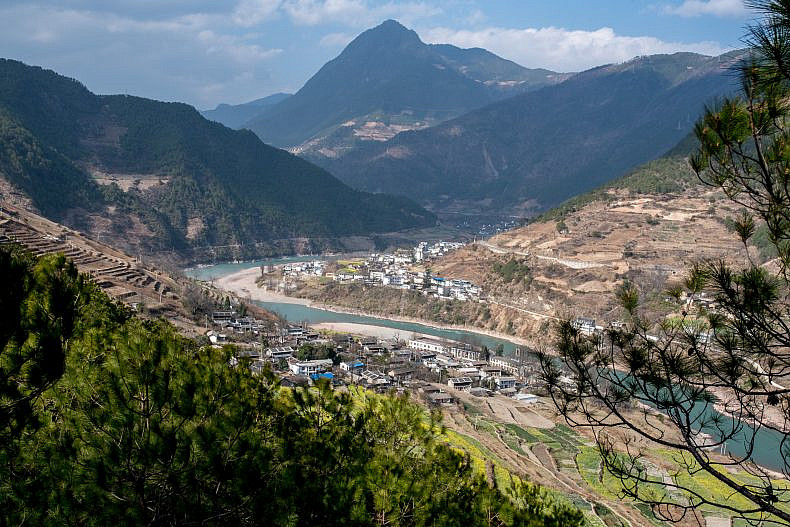
Xialuoga will be flooded when the nearby dam is competed. Photo by Luc Forsyth.
A Pastoral Postcard
Located across the Lancang from the town of Baijixunxiang and connected to the outside world only by a steel-cabled suspension bridge, Xialuoga was so small as to not appear on Google Maps. Where searching for Baijixunxiang — itself tiny by Chinese standards — revealed a post office, several restaurants, a hotel, and a few parallel roads, the place where Xialuoga should have appeared was represented by only by name and a blank expanse of beige pixels. Only by switching to the photographic satellite view did the village appear, as if to indicate that, although Xialuoga may be physically there at the moment, it was probably best to forget about it.
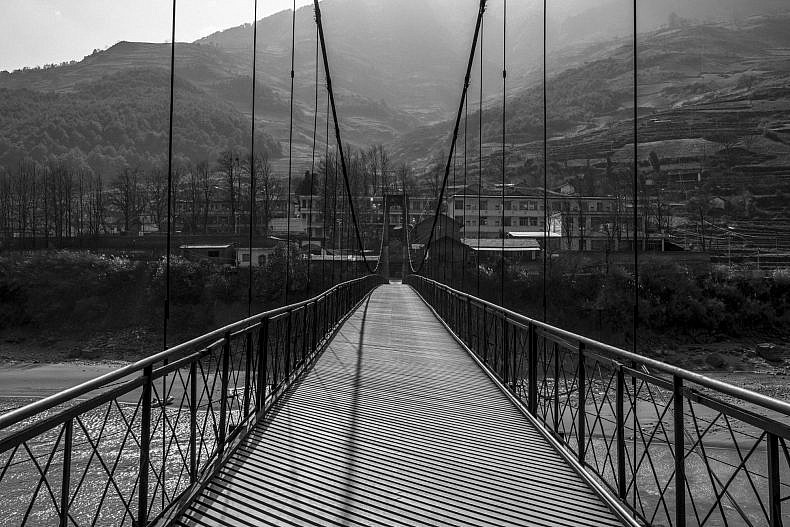
Xialuoga is connected to the outside world only by a steel-cabled suspension bridge. Photo by Gareth Bright.
On the ground, however, Xialuoga was very much real and the picture postcard of simple pastoral life. While Yunnan had been beautiful in its entirety, the further north we moved, the more dramatic the landscape became. The mountains were rising higher as we approached the Himalayas and the snaking valley that held the Lancang correspondingly deepened.
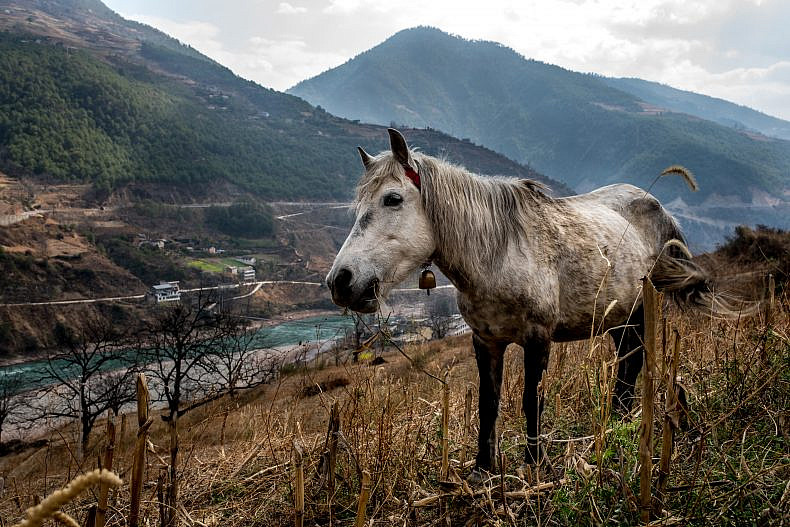
A horse grazes on the mountain sides overlooking the village of Xialuoga and the Lancang. Photo by Luc Forsyth.
Goats, donkeys, cows, and horses — all manner of domesticated animals grazed on the dry grasses that covered the hillsides, cautious but accepting of our company in the cold, fresh winds that gusted over the mountaintops. Bright yellow canola flowers, used to produce cooking oil and as fattening fodder for pigs, added striking patches of color to the winter landscape. It was quiet, and incredibly beautiful.
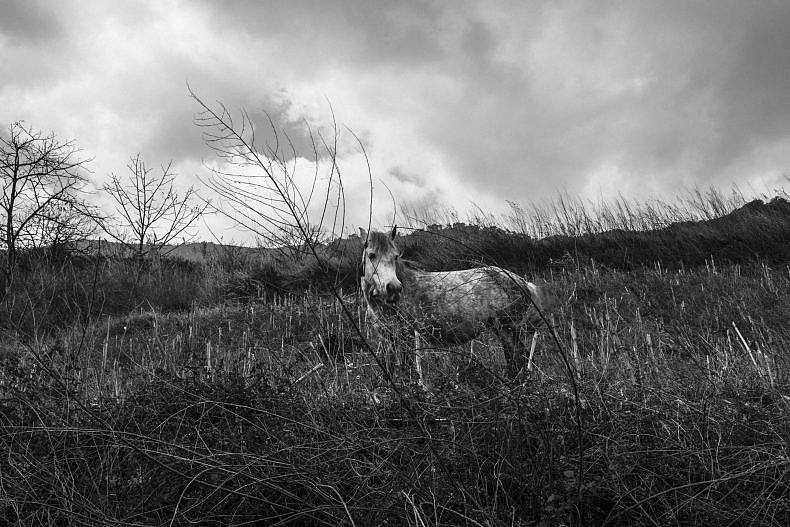
Horses and donkeys graze the mountain sides overlooking the village of Xialuoga. Photo by Gareth Bright.
“I’ve lived here my whole life,” Chao Yunsheng said. A weathered 78-year-old, Chao had lived through turbulent times. “Life is much better now. When I was a boy we often did not have any food to eat. Things are much easier now.”
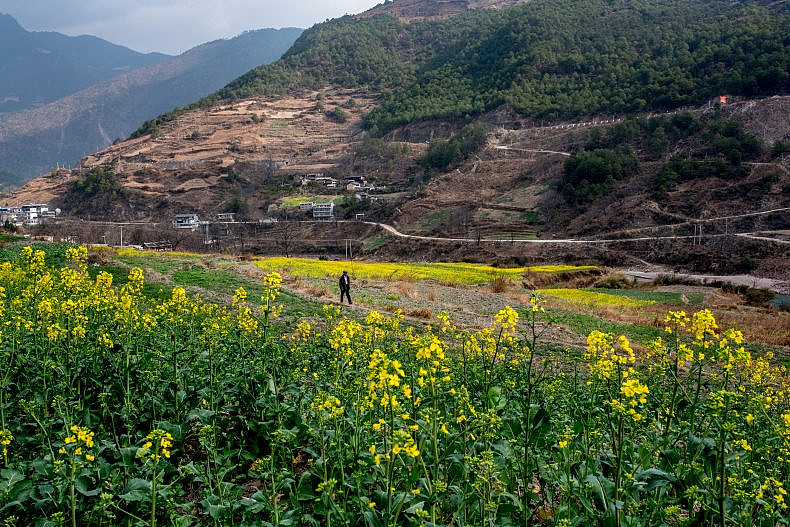
A man walks through the canola fields surrounding the village of Xialuoga. Photo by Luc Forsyth.
Over the course of his life Chao had expanded his family’s land holdings to a respectable 20 mu (a mu is an old Chinese system of measurement still used in conjunction with the metric system. One mu equals 666.7 square meters). Though lack of irrigation systems and decreasing annual rainfall meant that he had long since quit growing rice, he nevertheless used his land to good effect by growing corn and grazing a herd of 90 goats.
“I have a lot of land now, and I have given it to my three sons,” Chao said. “My youngest son went to another province to work so I help [the other two] with the farming and animals.” Yet when the 900 megawatt Tuoba dam goes on line, much of his sons’ inheritance would be lost.
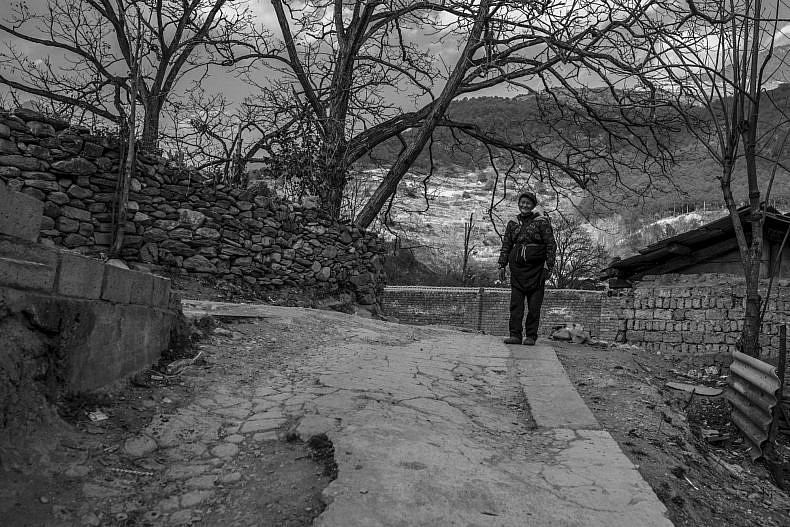
A man stands near his home in Xialuoga. Photo by Gareth Bright.
“The whole village will flood and we will have to move higher up the mountain. Out of the 20 mu we have, all but two will be lost. We will be able to keep grazing our goats, but there will only be a small area left for farming,” Chao told us. Considering that his crops account for roughly half the family’s income, the loss of 90 percent of his cultivatable land would be a serious financial blow.
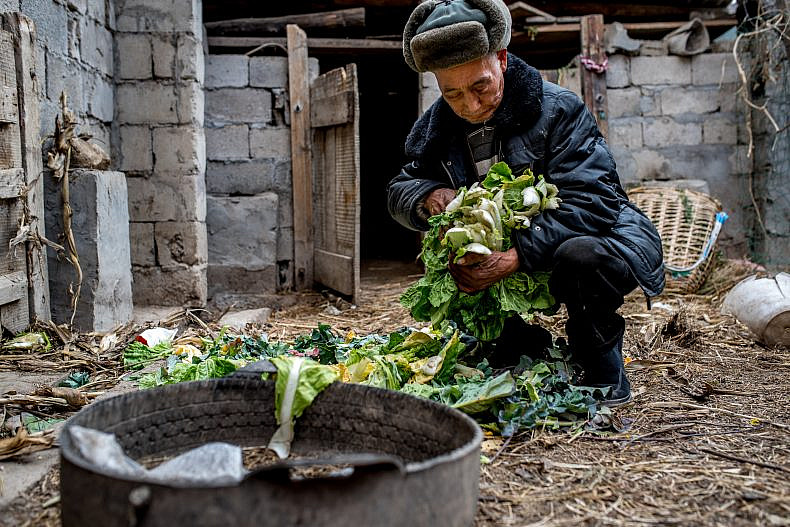
Chao Yunsheng, 78, prepares vegetables to feed to his livestock in the village of Xialuoga. Photo by Luc Forsyth.
Compensation, Contemplation, and Corruption
“I don’t know what’s happening,” 75-year-old Li Ruqi said as he sat in front of his small shop overlooking the Lancang. “This dam has been talked about for a long time, but there have been many delays and I have no idea when it will be finished. But if the government says I have to move, then I will have to move.”
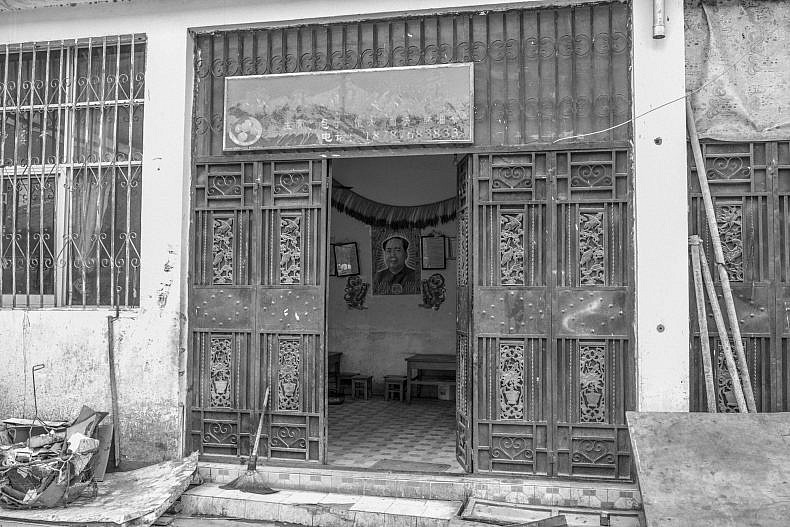
A portrait of Mao hangs inside a building in Xialuoga. Photo by Gareth Bright.
Throughout Xialuoga and across the river in Baijixunxiang (the low-lying areas of which will also be flooded by Tuoba’s reservoir), locals shared the same uncertainty as to the timing of their relocation. Referring to the compensation package to be offered for evictees by the government, a hotel owner in Baijixunxiang said “We haven’t signed the deal, and many others haven’t either. We don’t know when it’s going to happen. If we don’t sign, they will probably force us to demolish the hotel anyways.”
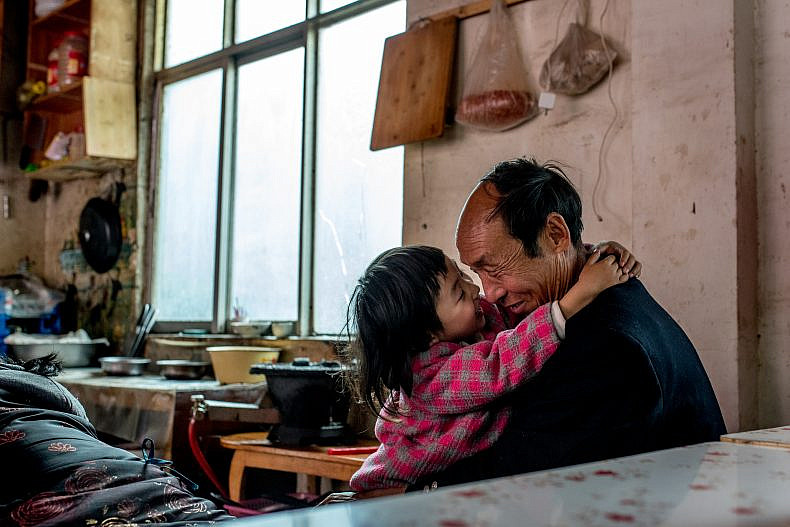
A father plays with his daughter in a small restaurant in the village of Xialuoga. Photo by Luc Forsyth.
The hotelier, who was hesitant to share his name, directed the majority of his anger toward local officials, whom he accused of corruption. “Even if we get good compensation packages, much will be lost to corruption. [The dam builders] Sinohydro pay the money to local government officials and by the time it gets to us a lot of it will be gone. There have been many anti-corruption campaigns [across China], but this is a very remote place and they can do what they want here.”
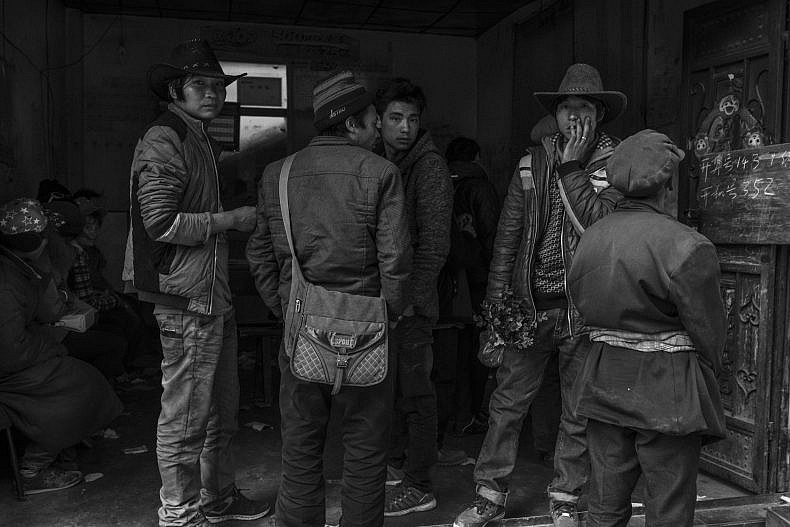
Men in the village of Xialuoga. Photo by Gareth Bright.
Chao Yunsheng expressed similar frustrations, but was quick to point out that this was a problem at the local level and he placed no blame on the larger government apparatus. “The new president [Xi Jinping] is very good!” Chao said emphatically. “He gave out bags of rice to people with disabilities, which is very nice and the old presidents did not do. I have problems with my eyes, so I should have got two bags of rice but I only got one. This is proof of the corruption.”
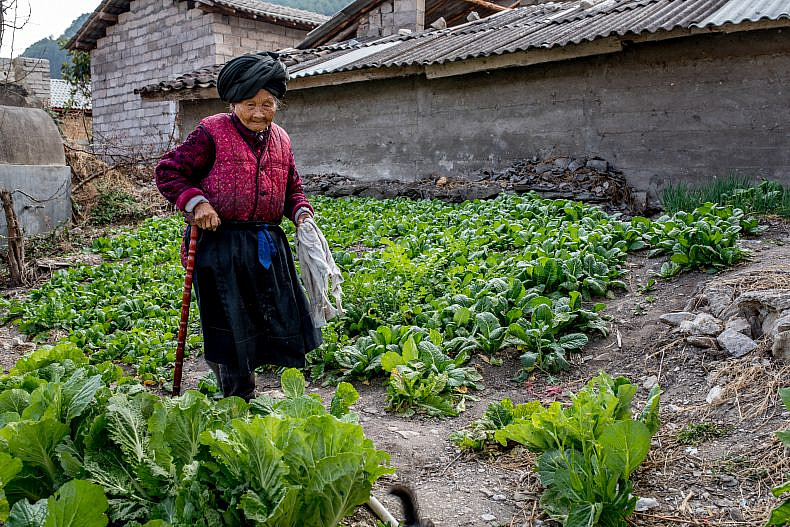
An elderly woman tends to her vegetable plot in the village of Xialuoga. Photo by Luc Forsyth.
Li Ruqi expressed even more faith in the national government, telling us that “I have no concerns for the future of my six children. The government will look after them.”
Though almost everyone we spoke to in Baijixunxiang and Xialuoga said they had been visited by surveyors who took measurements of their property, none had a clear picture of how much they would be compensated. Chao Yunsheng, however, said he thought he knew the value of at least one thing — his family’s ancestral graves. “I heard that we will be paid 1200 yuan (roughly $185) per grave.”
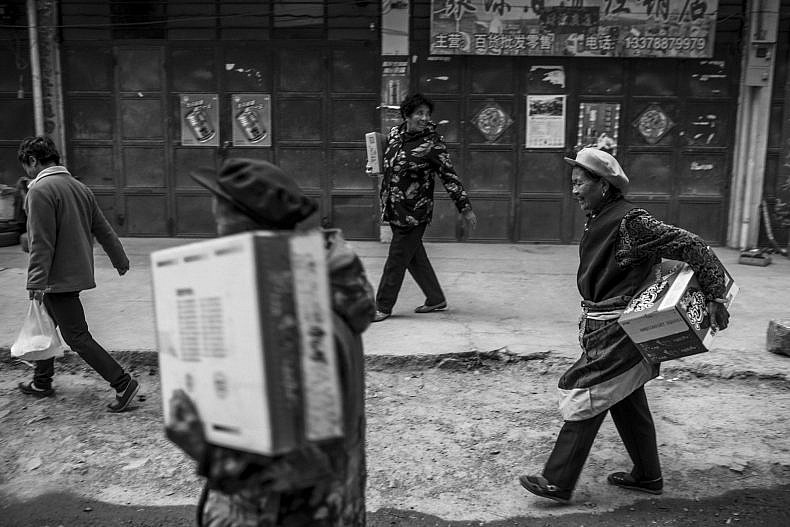
No one in Xialuoga is quite sure when they will have to move, but one day they will. Photo by Gareth Bright.
While Chao’s prediction about the value of his ancestor’s remains were unconfirmed, one thing was certain: when Tuoba’s 60m deep reservoir arrived, life in Xialuoga would change forever.
This piece originally appeared at A River’s Tail.













